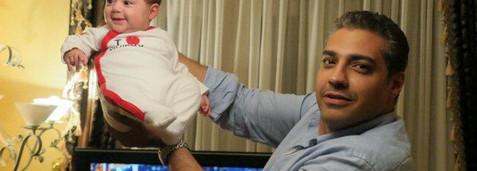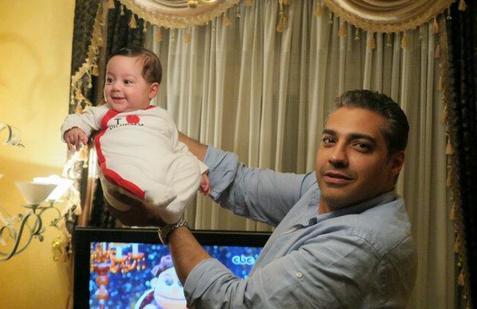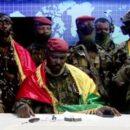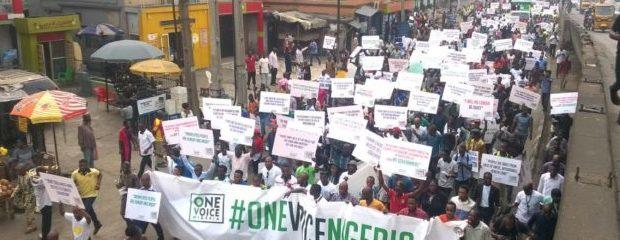In-depth interview with Mohamed Fahmy: ‘I am free. Now let’s free the others.’

In an exclusive interview, the #FreedAJStaff tells African Arguments about how he coped in prison, why he’s suing Aljazeera, and who we should turn the spotlight on next.
After 20 months and a long global campaign, Mohamed Fahmy and Baher Mohamed were finally pardoned and released from Egyptian prison on 23 September. The two Aljazeera journalists – along with colleague Peter Greste – had been arrested in December 2013 on charges of reporting false news and damaging national security.
The charges were understood to be politically-motivated, yet despite meagre evidence and a huge global campaign to free them, the three journalists were sentenced to 7-10 years in June 2014. The international campaign continued, drawing in governments, human rights organisations, high-profile figures from around the world, and a huge social media movement under the hashtags #FreeAJStaff and #JournalismIsNotACrime.
In February 2015, Peter Greste, an Australian national, was finally deported back home while Fahmy and Mohamed were released on bail ahead of a retrial. At that retrial, the two Aljazeera staff were found guilty again and sentenced to 3 years.
However, the next month in September, President Abdel Fattah el-Sisi surprised the world by pardoning them.
A couple of weeks after being released, African Arguments got the opportunity to meet up with Mohamed Fahmy at his hotel as he was passing through London and speak to him about his time in prison, his $100m case against his employers Aljazeera, and where he believes our attention ought to be directed next.
You’ve spent your whole career asking the questions. How does it feel to now be answering them?
I am now more convinced than ever that journalism is our oxygen, our last line of defence in keeping our word and our stories alive, and maintaining our rights.
In the month I spent in solitary confinement, I’d just hear snippets of news and that made me realise I was fighting for a bigger cause than myself. I think I’ll be back on the job very soon.
Tell me about the moment you heard you’d been pardoned.
I had no idea it was going to happen. My wife had just visited me and after a family visit you tend to become very gloomy because you know you’re not going to see them again for a week or longer and it reminds you of how pitiful your situation is.
I went back to my cell and my name was being announced on TV literally as I was walking in and I couldn’t believe it. I hugged my cellmate Baher Mohamed who was also pardoned. We were dancing in the cell.
I didn’t think they’d release us immediately. I think the Egyptian president wanted us to spend the first day of Eid festivities with our families so he made sure we were released as soon as possible. They left us in the street in our prison garb with no money and no phone. We had to find a way to call our families. It was a very historical moment that I know I’ll remember the rest of my life.
We expressed our gratitude to everyone that stood by us. I spent the first day with my wife. We were a very happy couple for very simple reasons. You realise what freedom means and you value it more than ever. I did feel like I was born again.
When you were first imprisoned, I think a lot of people expected you to be released quite soon. Was there a moment you realised you were actually going to be in there for a long time?
I never thought it would be that long. When we were arrested, they took us for interrogation and then we were sent to Scorpion Prison, a maximum security prison reserved for jihadists and terrorists and Islamists.
I just couldn’t believe where I was. One minute you’re in the 5-star Marriot Hotel, the next minute you’re with Mohamed al-Zawahiri, the brother of Ayman, head of Al-Qaeda. You’re with jihadists who just came back from Syria fighting with Ansar and ISIS, who are coming back to topple the Egyptian regime. You’re surrounded by senior members of the Muslim Brotherhood. It’s quite a shock, but still my mind would not accept this, and you just think the nightmare will be over tomorrow. But three weeks later when they referred the case to trial, I realised we were in deep deep trouble, and for accusations that were horrific − conspiring with the Muslim Brotherhood, financing and providing them with equipment, fabricating news to serve their agenda and to smear Egypt’s reputation, operating without proper licences. It was really scary.
How did you cope?
You do have to keep a balance between your physical, mental and spiritual wellbeing, so you try to exercise when you can, even if it’s just in your cell. There was no reading material in the beginning so it was tough to keep yourself busy and distracted.
Baher and I initiated a radio mock show. We weren’t allowed out of our cell, but there is a small window in the door overlooking the corridor and the other cells. If you look out the window you can see the eyes and a bit of the face of the other prisoner. It’s very surreal. But it meant we could communicate verbally, so at a certain time at night, we’d asked everybody to go to their cell door and we’d say: “Okay, we’re starting the Aljazeera radio show. We’re going to begin with Mr So-and-so and he’s going to recite some poetry”. And then I’d switch to someone who was former President Morsi’s foreign affairs minister, for example, and I’d interview him about his visit to Obama and what happened. Then, I might play the devil’s advocate – as us journalists do sometimes – and I’d ask a jihadi who’s very extremist and ask him what he thought of the Muslim Brotherhood when they ran Egypt for a year. I remember one of them said: “Well, they didn’t listen to us and were too soft and that’s why we’re here today. We gave them advice and told them to chop off the heads of the generals and they didn’t listen to us.”
We took this radio show very seriously like we were really at work. That’s how we kept ourselves going because we journalists spend a lifetime trying to get close to these jihadists on the ground. Some of our friends have died, some have been slain lately getting close to these people and here they are – you have a lifetime exclusive. That’s how we kept the time going and it was really important because those two hours keep you busy and elevate your mood. It was nice, it was ok…
What were the low points of your time in prison?
The low point was when we were sentenced to 7 years in the first trial. I was expecting to be acquitted. I had actually smuggled out a celebratory letter and asked my wife to send it to all the journalists when the sentence was announced. If you see in the video when they announced the sentence, it took about 7 cops to get me out of the cage. I was clinging onto the bars. I couldn’t believe it. Even talking about it now…
The next day we had to change from our white clothes to blue clothes reserved for convicted prisoners, and this is when I opened the newspapers and saw images of my family crying and that was my low point. I broke down in tears for the first time. All of us did. If you look at Egypt’s history and see the trend of sentences, those who get sentenced actually do their time. It is very rare to get a pardon.
Why do you think you were pardoned?
I think the motive was the result of an unprecedented global campaign. My family and wife did non-stop lobbying. My lawyers were not just working in court but lobbying behind closed doors too. And finally the armies of diplomats around the world stood up for us. I think the Egyptian president just wanted to minimise the damage and end this whole headache, especially as he tries to improve the image of Egypt and before he was going to the UN.
Did it feel like the #FreeAJStaff campaign changed in any way after Peter was released in February?
No, it was a very powerful campaign all the way. We, my family, started the campaign inside Egypt. Aljazeera continued their arrogance by not lobbying where we were actually detained. They lobbied all over the world, spending millions of dollars on conferences in London and LA, having full-page ads in New York, but they should know that the Egyptian government is very sensitive to someone telling them what to do.
This stuff can backfire, so we started lobbying inside Egypt and appealing to public opinion. Even if you’re a judge, you’ll be affected by public opinion when you start seeing the public sympathising with this guy who overnight has become framed as this Muslim Brotherhood Qatari agent, an evil fabricator of news, public enemy number one. This is also where Amal Clooney comes in. She was lobbying Egyptian ambassadors abroad, reminding them this guy protested against the Muslim Brotherhood. In between my job at CNN and Aljazeera I protested – I wanted them gone – and now you’re presenting me as a member of the Muslim Brotherhood.
I wasn’t depending on Aljazeera at all. I had stopped communicating with them. I was furious with them.
Do you think Aljazeera’s more internationally-focused campaign was misdirected or do you see it as cynical in some sense?
I think it was important as a campaign that kept the story alive and made it clear we were innocent, but that wasn’t enough. They needed to have parallel strategies and a good legal team. What they brought to the court was the exact opposite. They brought a legal team that turned against us. It was like a scene from a surreal movie where there’s an unbelievable twist. I had brought my own lawyer from day one, but at one point the lawyer representing Peter and Baher walks up to me in the cage and tells me the best thing I did was get my own lawyer. “I’m dropping a bomb today”, he said. He walks up to the judge and says he’s withdrawing from this case because Aljazeera sued Egypt for $150m compensation claim in London and he refused this lawsuit because it harms his clients.
He said he believes the network is more interested in using the case to fight Egypt, and that Qatar is using the case abroad in their campaign against Egypt. There’s no doubt that we were pawns.
In your experience, where does Aljazeera English, which you worked for directly, fit into the broader Aljazeera family?
I took the job because I believed Aljazeera English was a separate channel and had a much more professional and objective line than the pitiful of excuse for journalism called Aljazeera Mubasher, which was a 24hr channel for Egypt in Arabic. There were many prominent journalists at Aljazeera English that I knew and I jumped at the opportunity but with reservations, which were very clear and in writing. I said to please keep me away from the Mubasher channel.
They breached that agreement. I started on 8 September. Mubasher had been shut on 3 September. The Egyptian court had issued a judgment saying the channel was biased and a threat to national security. Part of my anger is that the English management started sharing my reports on the banned Arabic channel, dubbing them and rebroadcasting them. So immediately we were put on the radar of the authorities.
I’m very clear that I haven’t forgotten who put me behind bars, but I’m also clear Aljazeera portrayed deliberately negligence and misrepresentation that contributed immensely to the case against me and gave my captors more ammunition.
And it gets worse. During the retrial, after Peter had left, Baher and I are standing in the cage on 19 November and the prosecutor presents a report to the judge that states the licence to broadcast had been cancelled on all Aljazeera’s channels on 3 September. That means we were in the Marriot hotel, not in the office, because the network knew the broadcast licence was revoked.
All this stuff is just unacceptable, and that is why I am suing the network [for $100m] in a British Columbia court. I am doing it as a matter of principle and also as a matter of protecting many of my friends in Aljazeera who believe and corroborate what I say. Some of them have spoken on the record to other organisations while others have decided to not talk right now, but very soon you’ll see them trickling in on the media.
[Aljazeera has responded to these allegations and strongly denies them.]
Now that you, Baher and Peter are free, where should our attentions turn next?
I am now directing the spotlight and attention on protecting and advocating for journalists behind bars across the globe. There are over 200 journalists behind bars in the world and 65 have died just this year.
Steven Sotloff, before he went to Syria, came to visit me in Cairo and asked for my flak jacket. Seeing Steven killed by ISIS while I was in prison and then realising so many of my friends are in prison, I decided to start the Fahmy Foundation.
Shawkan [Mahmoud Abou Zeid], an Egyptian photographer who has done nothing wrong, has been in prison for 2 years. He’s one of the people I’m advocating for and I’ve spoken about him on Egyptian talk shows to keep his plight alive the way my plight was kept alive.
Woubshet Taye from Ethiopia is someone we’re fighting for as well. His letters written from prison are on our website, I’ve spoken with his wife, and we’ll continue to fight for him.
Jason Rezaian is in prison in Iran.
Qatari poet Mohammed al-‘Ajami has been sentenced to 15 years for writing a poem about the Arab Spring.
Raif Badawi in Saudi Arabia has been sentenced to 1,000 lashes and 10 years for giving his opinion about Islamic clerics.
What’s your message to those who may have signed petitions and protested for your release and who think that now you’re free the campaign is over?
My message to them is that my colleagues in absentia have not been pardoned yet. We should continue to call for their pardon.
Secondly, my duty in highlighting Aljazeera’s mistakes is a way of expressing my gratitude to all those who campaigned. We’ve got to recognise that freedom of expression is not just expecting governments to respect our right to report freely and safely; it’s also expecting the network to put the safety of journalists above any story and to continue to work transparently towards our craft of the Fourth Estate.
James Wan is the editor of African Arguments. Follow him on twitter at @jamesjwan.








One of the most important insights in this fascinating piece is how these huge international activist campaigns lobby the ‘global’ press by mobilising public opinion in Paris, London and New York, but often forget the primary importance of engaging with local institutions, civil society and political figures in bringing about change.
This is a very fascinating revelation. It is a shock to realise that whilst Fammy’s employers were telling us that their detained staff were innocent, they were busy following a different political agenda which worsened their case. This is very deceptive and I support his decision to fight back. I hope he will remain motivated in his cause to join the campaign to shine a light and liberate journalism all over the world.